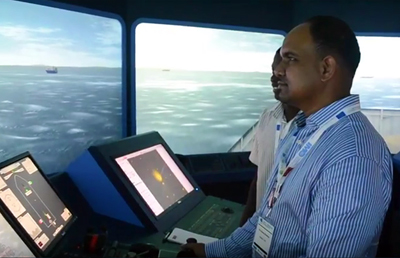IMO video outlines how the Global MTCC Network (GMN) initiative is uniting Maritime Technology Cooperation Centres (MTCCs) in targeted regions into a global network.

A global network of Maritme Technology Cooperation Centres will promote technologies and operations to improve energy efficiency in the maritime sector.
All industries are looking to becoming cleaner, greener and more energy efficient – and shipping is no exception. Improved energy efficiency means less fuel is used, and that means less harmful emissions.
The International Maritime Organization (IMO) – the United Nations specialized agency with responsibility for safe, secure and environment-friendly shipping - is leading a European Union funded project designed to help shipping move into a new era of low-carbon operation.
IMO has launched a video outlining how the Global MTCC Network (GMN) initiative is uniting technology centres – Maritime Technology Cooperation Centres (MTCCs) – in targeted regions into a global network. Together, they are promoting technologies and operations to improve energy efficiency in the maritime sector.
“This project is one of the building blocks that will help shipping becoming greener,” says Magda Kopczynska, Director, DG MOVE, European Commission.
Five MTCCs have been established in Africa, Asia, the Caribbean, Latin America and the Pacific. Acting as centres of excellence for their regions, the MTCCs will work with partners to develop technical cooperation, capacity building and technology transfer – sharing the results and their experiences throughout the network to ensure a common approach to a global issue.
Innovative programmes and projects are being developed and carried out by the MTCCs - all designed to promote energy-efficient technologies and operations.
Developing countries and, in particular, Least Developed Countries and Small Island Developing States, will be the main beneficiaries of this ambitious initiative.
For regions particularly vulnerable to the impact of climate change, it’s a chance to get involved in promoting technologies and operations to improve energy efficiency in the maritime sector.
“When we saw this project, we saw it as an opportunity to build partnership throughout the region to mitigate, at least in the maritime sector, the impacts of climate change,” says Vivian Rambarath-Parasram, Head of MTCC-Caribbean.
Estimates say ships’ energy consumption and CO2 emissions could be reduced by up to 75% by applying operational measures and implementing existing technologies. The GMN is on the cutting edge of climate-change mitigation – and, at the same time, opening up a world of opportunities for those who participate in it.
“We’re looking forward to building capacity for not just Kenya but for the African region in general - to reduce greenhouse gas emissions, to improve air quality in our port cities,” says Nancy W. Karigithu, Principal Secretary Maritime and Shipping Affairs, Kenya.
By promoting technologies and operations to improve energy efficiency in the maritime sector and helping navigate shipping into a low-carbon future, the GMN project is steering a course for a cleaner, greener future.
GMN website: http://gmn.imo.org/
The GMN project is funded by the European Union and implemented by the International Maritime Organization (IMO).
- MTCC-Africa, hosted by Jomo Kenyatta University of Agriculture and Technology, Mombasa, Kenya
- MTCC-Asia, hosted by Shanghai Maritime University, China
- MTCC-Caribbean, hosted by University of Trinidad and Tobago, Trinidad and Tobago
- MTCC-Latin America, hosted by International Maritime University of Panama, Panama
- MTCC-Pacific, hosted by Pacific Community, Suva, Fiji
